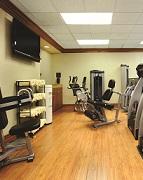

The bottom line is always the number-one consideration. How much is it going to cost, per athlete, to travel to a specific event? That’s the first thing parents, coaches and others always want to know. (And in cases where some teams are doing fund raising in order to get their expenses covered, there’s no denying it is a big – and important – issue. We once had a coach ask us, “How many steaks do the kids have to sell for us to make this work?”)
Also essential is the issue of participants’ safety. We look at this several ways:
Layout of Hotel: We tend to prefer to book youth teams into properties with interior hallways, rather than those where the individual room doors are on the outside of the building. A layout like this allows chaperones to maintain better control of the participants.
Concentration of Rooms: We also try to work with hotels with enough space to put team members all on one floor, if possible. Again, this is a chaperone issue, but it makes it easier for team managers and others if they know their charges are all in one general area, rather than all over the building
Location of Hotel: You will sometimes hear us refer to a good hotel for kids as being situated ‘in the middle of nowhere.’ We do not mean this in a negative sense; we mean that if the property isn’t located across the street from a mall or a restaurant park, for example, you have less chance of kids wandering off the premises to check out something that looks interesting. We would also advise avoiding a hotel with an onsite nightlife component.
Neighborhood: When teams book into a hotel, the organizers need to be confident that the neighborhood the hotel is located in is a decent one. (In other words, even though a low, low room rate might be unbelievably enticing, it should also serve as a red flag. After all, a hotel may have some bargain basement costs, but you won’t enjoy the savings if you are constantly worried about your safety, and that of your athletes).
 Having satisfied the basic requirements of rates and basic hotel location and layout (which translate into participant safety), it’s time to move on to other things that are popular in team travel. These might include:
Having satisfied the basic requirements of rates and basic hotel location and layout (which translate into participant safety), it’s time to move on to other things that are popular in team travel. These might include:
Breakfast-Included: A hotel whose room rate includes a breakfast buffet in the morning is definitely something that is popular with teams. Having one less meal to buy means a better bottom line – and happier parents of athletes. In cases where a hotel does not offer a breakfast buffet, we have tried to find properties with an adjoining restaurant (Denny’s, for example) so that we can have a place athletes can eat each morning.
Fitness Facilities: Hotels that have fitness facilities are generally popular among travel teams. The athletes may not want to use the equipment, but coaches, chaperones, officials and any others who happen to be staying in town for the sports event will be able to take advantage of this, and will be grateful for it.
Rooming needs are something, of course, that must be considered. Don’t just think about how many rooms you need; think about what types you need. In youth team travel, we’re usually looking for a property that offers quad facilities, meaning a block of rooms with two queen (not double) beds each. With this kind of arrangement, you can fit three to four athletes in one room. Not every property will have this, but it is preferred.
 When it comes to hotel brand, we as a travel agency have found there are some chains where there is great continuity and dependability in terms of quality. Many organizers are unable to perform a site inspection for every location their teams plan to play in, or every hotel they’re going to use, so they have to rely on the reputation of a brand, and the experience they have had in the past. (And while you will find plenty of very nice non-brand, or ‘boutique,’ hotels in each city, it has generally been our experience that they’re not really serving the youth team travel market).
When it comes to hotel brand, we as a travel agency have found there are some chains where there is great continuity and dependability in terms of quality. Many organizers are unable to perform a site inspection for every location their teams plan to play in, or every hotel they’re going to use, so they have to rely on the reputation of a brand, and the experience they have had in the past. (And while you will find plenty of very nice non-brand, or ‘boutique,’ hotels in each city, it has generally been our experience that they’re not really serving the youth team travel market).
Of course, as a travel agency, we recommend that sports organizers and travel teams make their lodging arrangements by working with a travel agency – and in particular, a travel agency with experience in sports teams. Those agencies will know how to get hotel rates that are good, and how to request specific room blocks, favorable terms in case of unexpected cancellations or early departures and so forth. They have extensive experience in negotiating hotel contracts and know who to talk to and what to ask for. In short, they’re someone on the inside of the industry, working on your side. Look for an agency that is insured, and one that has a travel license in your state. This will protect you as the consumer.
Consider this scenario: If a team (or in the case of a large event, many athletes, family members, officials and other personnel) arrive in a city and the organizer or planner is told the hotel can’t accommodate all the participants because of an overbooking situation, what is the next step? For those who have booked their lodging through an agency, the answer is easy: call the travel agent, who will work on the team’s behalf to resolve the situation. (That same agent is also capable of setting up air or bus travel and group dinners for the team – but that’s a topic for another day).
 Planners and organizers who insist on making reservations on their own (using an online discount travel site, for example), should be aware of the potential for problems. These might include booking a hotel in a location that is far from the tournament venue or one in a neighborhood that you would never, in a million years, choose for yourself. It might mean the hotel is a run-down property that is badly in need of renovations. The hotel might not have rooms that are conveniently situated for the athletes, or you might find that athletes are scattered randomly in separate wings or the hotel or separate buildings. In addition, you might have unwittingly booked during a busy time such as when a big convention is in town, or during college spring break – when the room rates are higher, traffic is heavy and restaurants are crowded. These are all things the travel site won’t be able to guard against, or warn you about.
Planners and organizers who insist on making reservations on their own (using an online discount travel site, for example), should be aware of the potential for problems. These might include booking a hotel in a location that is far from the tournament venue or one in a neighborhood that you would never, in a million years, choose for yourself. It might mean the hotel is a run-down property that is badly in need of renovations. The hotel might not have rooms that are conveniently situated for the athletes, or you might find that athletes are scattered randomly in separate wings or the hotel or separate buildings. In addition, you might have unwittingly booked during a busy time such as when a big convention is in town, or during college spring break – when the room rates are higher, traffic is heavy and restaurants are crowded. These are all things the travel site won’t be able to guard against, or warn you about.
Your job, when organizing and planning a sports event, is just that: planning and organizing. You should be able to arrive in the city and expect the lodging, transportation, tournament venue and everything else will be ready to go. Worrying about hotel and lodging issues – especially upon arrival – should not be your problem.
Nor should it be a concern of your athletes. We like to say that the best benefits of travel teams are intangible. When organized and implemented well, team travel is a great bonding experience that creates lifelong friendships and wonderful memories. We have seen siblings share with one another the stories about their travels to tournaments in other cities; in turn, the younger children look forward to the day when they are old enough to take part in such trips and create memories of their own. The right hotel for them to relax in after the competitions are over is just one part of the whole experience.

